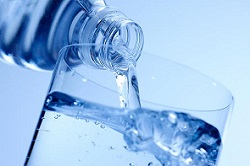The Importance of Staying Hydrated

The human body can survive up to 3 months without food, but is unable to last even a week without water. Water forms about 60-70% of your body and is required by every system to properly carry out its functions. You lose water when you sweat, urinate, defecate and even when you breathe. Therefore, regular intake of water is necessary to replenish this loss and help your body function effectively.
Water forms a structural component of the different tissues and organs in your body. Water is vital for:
For regular encouragement, motivation, recipes and more Like us on Facebook.
- Physical activity: Water helps your lungs function effectively, transporting oxygen-rich blood to various parts of the body, reduces the use of glycogen (an energy reserve), saving it for high-intensity activities, and forms sweat which prevents you from overheating. Feel like you’re oxygen deprived when exercising? Try increasing water intake on a regular basis.
- Proper digestion: Water forms saliva in the mouth, acid in the stomach, and helps transport nutrients and waste products through your GI tract.
- Joint Health: Water lubricates your joints, assisting in movement
- Protecting your organs from physical damage: Did you know that water acts as a shock absorber for vital organs such as the brain and spinal cord and cushions the fetus in uterus during pregnancy?
- Keeping a good core temperature: Water regulates body’s temperature by sweating and respiration and keeps your body at a temperature that is best for health.
The amount of water you need depends on your gender, level of activity, climate and geographical location.
Per day, an average adult male requires 3 liters of water (13 cups) and the adult female 2.2 liters (9 cups). This includes the water that you receive through food which is why the recommendation is generally 8 cups of drinking water per day. Losing even as little as 3-5% of your body’s weight in the form of water can drastically affect your physical performance.
Dehydration occurs when you lose more water than you take in. Dehydration is a particular risk if you’ve had vomiting or diarrhea, excessive heat exposure, fever, severe skin injuries and infections like burns and sores.
Symptoms of dehydration include thirst, dry mouth, reduced urine output, dizziness, confusion, fatigue, a faster heart rate and breathing, or in severe cases, loss of consciousness. It can also lead to hormonal imbalances, such as a decrease in testosterone (affects sexual function and muscle mass), increase in cortisol (immune system suppression and increased blood pressure) and increase in insulin levels in your blood (leads to diabetes). Brain functions are also affected by dehydration (thinking and attention, anxiety, mental tension and headaches). Chronic dehydration can lead to weight gain as it affects the metabolism of fat. Increasing your water intake speeds up your metabolism and suppresses hunger, preventing you from overeating.
If you’re looking to achieve or maintain health make sure to think of water first. It’s a relatively easy (albeit not always the most exciting) way to improve health of most major systems in your body. For more flavorful ways to get your water in or for more fun facts on water check out our Thirsty Thursday posts on Facebook every Thursday.
Dallas
3800 San Jacinto
Dallas, TX 75204
(214) 827-8777
Driving DirectionsHours:
Monday, Wednesday,
Friday: 8:00 a.m. - 11:00 a.m.
Tuesday: 4:00 p.m. - 7:00 p.m.Grapevine
823 Ira E. Woods Avenue
Grapevine, TX 76051
(214) 827-8777
Driving DirectionsHours:
Thursday: 1:30 p.m. - 5:00 p.m.






